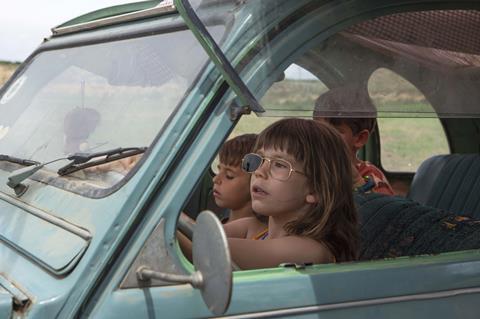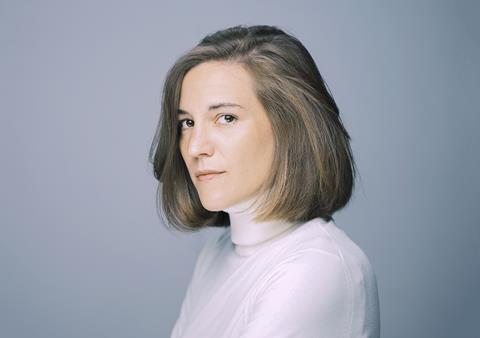Catalan filmmaker Carla Simon graduates to Berlin Competition with Alcarras, five years after Summer 1993 won her the festival’s best debut prize. She talks to Screen about her family-inspired second feature.

The Berlinale is a landscape Carla Simon knows well. The Catalan director attended the festival as a Berlinale Talent in 2015, and two years later she won Generation Kplus’s best debut prize and grand prix with Summer 1993, a drama about a little girl trying to cope with the grief of losing her parents. Her second feature Alcarras is now premiering in Competition and also deals with loss — this time of a way of life on a family-run peach farm. As with her debut feature, the story springs from the filmmaker’s first-hand experience. mk2 Films is handling international sales.
How does it feel to be back at the Berlinale?
It feels like home. Berlin has been a constant source of joy for me, and not only because of Summer 1993. Two years ago, we came to the co-production market with Alcarras [where the project picked up the Eurimages award] and now I find myself at the grown-ups table alongside filmmakers I admire, such as Claire Denis and Isaki Lacuesta [in Competition with Both Sides Of The Blade and One Year, One Night respectively]. I still can’t believe it.

Looking back, I’m almost nostalgic of my innocence when I presented Summer 1993. I remember people telling me, “Well, let’s see what the reviews say about the film,” and I wasn’t even aware of that. “Reviews? What reviews?”
At the first screening, I was struck by the audience’s reception, of the emotional catharsis. Suddenly, I had the chance to share something very personal with a lot of people who I didn’t know. That’s what cinema is about, isn’t it? The shock was experiencing it from a filmmaker’s point of view.
Your childhood inspired Summer 1993, and Alcarras also has its basis in your family, taking the name of the village where they work as farmers in Catalonia.
My family, on my adoptive mother’s side, grow peaches. Their farm is fascinating: the expansive land, a harsh and dry landscape where nature has been tamed to grow fruit. People work hard but they are confronted with the constant cutting of fruit prices and the challenge of the new generations that don’t want to work in the fields. My grandfather died when I was preparing Summer 1993 and I guess that triggered my need to tell the story of Alcarras.
Has this love of your family’s profession shaped your own work?
I see cinema as something artisanal, with a small crew, with people that will let you try new things, having a say in the whole process. Pretty much like I have seen my family work the land, far from the big companies that take as much as they can from it and don’t care if it becomes barren down the line.
Your first film was told through the eyes of a six-year-old girl. What point of view is this story told from?
I found myself going for an ensemble cast and multiple perspectives this time. There isn’t a main character, we have a grandfather, mother, father and three children. I co-wrote the film with Arnau Vilaro, who is also from the area, and we’ve woven a story inspired by our respective families.
How was the experience of working with non-professional actors?
The first goal was to find people who came close in terms of energy, of soul, to the fictional characters on the screenplay. The casting process lasted a year. Luckily, that was before the pandemic. In order to make [our cast] feel like a family, we had long rehearsals and we improvised. I like to be precise when I shoot but they only read the screenplay once to have an idea of the narrative. During the shoot I focused not so much on the exact words but on the narrative function and energy of each scene.
How did you deal with the complications of the pandemic?
Lockdown was declared three months before production was meant to start in 2020. The peaches had to be in season, so we couldn’t postpone it further than the end of August. The idea of shooting with a large cast, with kids and elderly people, made us reschedule. It was sad to stop and leave it for the summer of 2021, but sensible and the best we could have done for the film. When we finally started to shoot, we had to halt production after three days because of some positive cases in the crew. I couldn’t believe it. But we made it.
You are part of a new generation of filmmakers in Spain, and of a new wave of women directors. You also had several women in key roles on Alcarras, including producer Maria Zamora and DoP Daniela Cajias. Do you sense an industry change in terms of gender parity?
In the case of Alcarras, it’s a matter of knowing each other so it wasn’t premeditated. But when women are in charge, they are more open to working with women. Lecturing, I’ve also discovered students nowadays have women directors as references and they see the idea of following in their footsteps more clearly. A lot of the filmmakers that shaped me are women: Claire Denis, Lucrecia Martel, Valeska Grisebach, Alice Rohrwacher… I like the diversity of Spanish cinema now — it’s diverse in the way of understanding cinema and diverse from a gender point of view.

























No comments yet